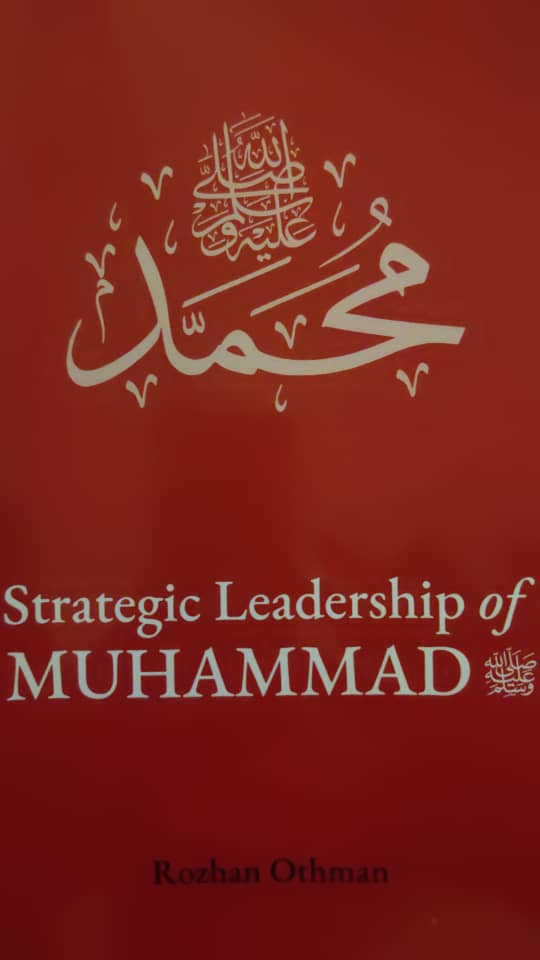Strategic Leadership of Muhammad SAAS: A review
Spanning over eight chapters, backed by copious notes on the early history of Islam, especially the life and military exploits of Prophet Muhammad SAAS, one might be inclined to think that Rozhan Othman is attempting yet more of the same.
Heavier references to the life of the Prophet SAAS, deeper commentaries of the actions of the companions and an even more orderly rendition of the Quranic phrases and the Hadith.
Admittedly the book “Strategic Leadership of Muhammad SAAS,” has all of the above features and more. But this book is unique in three distinct manners, if it were compared to the scholarship of Joel Hayward, author of “The Military Leadership of Prophet Muhammad SAAS.”
First and foremost, Rozhan Othman has broadened the canvass of the subject to strategic leadership. While this theme is deep and redolent with many pathways to seeing strategy from many standpoints, Rozhan Othman tried to encourage the readers to start on the basis of how one should constantly strive to see “forest from the trees.” More specifically the ” big picture.”
The big picture is not strictly victorious battles and triumphant wars – important as they are – but how each leader should learn, unlearn and relearn early that there is no guarantee to anything in life except sheer efforts when the faculty of the human mind and organizational abilities are creatively deployed.
Secondly, strategic leadership, in the estimation of Rozhan Othman, is not necessarily about leading one to military expeditions, of which Prophet Muhammad SAAS was responsible for 80 out of 87 martial excursions, but moulding the character of oneself and others.
Not in a seamless whole. For that would be akin to creating a cult. But to engineer the necessary space for moral, intellectual and psychological renewal long after the strategic leader has long passed the scene. Strategy for the lack of a better word is to build the necessary structure to create the human agency that can lead to a powerful legacy.
Thirdly, Rozhan Othman’s book, which is not meant to be read nor understood in one sitting, revolves on how strategy i.e. agency and legacy can be built upon the self, organization and the nation-state.
When one reads the work of Rozhan Othman within the triple contexts of the above, the goal then is to juxtapose the differences of Joel Hayward’s outstanding tract with that of Rozhan Othman’s exceptional effort no doubt.
What Roshan Othman tried to explain albeit without too much undue emphasis is that Prophet Muhammad SAAS’s life and struggles to exert himself gently on the canvas of history is not exclusive to Muslims only. Not Muslims and people of other faiths can imbibe on all strands of Islamic thoughts granted that Islam is a revelation intended as a compassion for all.
Indeed, Rozhan Othman began his concept of strategy in the very beginning of his book with a lucid but short exposition on the significance of intentionality. Strategic thinking and competence, as the latter chapters gradually unveiled, will “fail on first contact with reality,” if there is no constant effort to engage with worldly and other worldly issues.
Strategy, in this Islamic sense, is not due to a perpetual quest for material acquisition. Rather, an inner ethic to seek what Confucian scholars would call inner cultivation to raise one’s competence, respect for ceremony, cordiality and cooperation with human kind to achieve the most maximum amount of inter-agency; where civilizations, corporations and communities do not try to badger each other to pulp, such as the current state of the world in the Middle East, Eastern Europe and potentially the Indo-Asia Pacific.
Given the salience of Confucianism, Rozhan Othman’s impressive book can and must be made as one of those most important readings, not just among high school students but adults and mature civil servants, indeed, politicians in mono or multi cultural settings to understand the amazing feat of Prophet Muhammad SAAS.
As mentioned earlier, this is not a book that can be understood in one sitting. Strategy as Rozhan Othman has it is an acquired skill, indeed, taste. Not to be superior to others. But to conquer what the disciples of Sigmund Freud might be inclined to call “ego,” perhaps “super ego.” A strategic person must think in “perpetual time” and must be prepared for the perpetual task of being thrust into various challenges and leadership positions.
Quoting Khalifah Omar Ibn Khattab, Rozhan Othman was correct to affirm – without a shadow of a doubt – that the intellectual preparation for strategic thinking and the ability to make decisions that can best win the hearts and minds of all is to begin early.
Indeed, prior to anyone ascending any positions of power and preeminence, failure of which, will lead to the inability to listen let alone understand the difference between reality and sheer obstinacy.
The literature that Rozhan Othman consults may date back to 1970. But old is indeed gold. Since there is a common thread that pulls various strands of strategic thinking together. Strategic thinking is not about ideation and innovation per se.
If anything else it is about the iteration of the human mind to do things better at every stage of his or her life, with the goal to raise the collective welfare of others writ large, whether they are believers of Islam or otherwise.
The distinction that separates the two does not matter. Strategic thinking requires an enormous amount of patience and diligence to accept all without trying to overwhelm others through any material abundance or preponderance.

